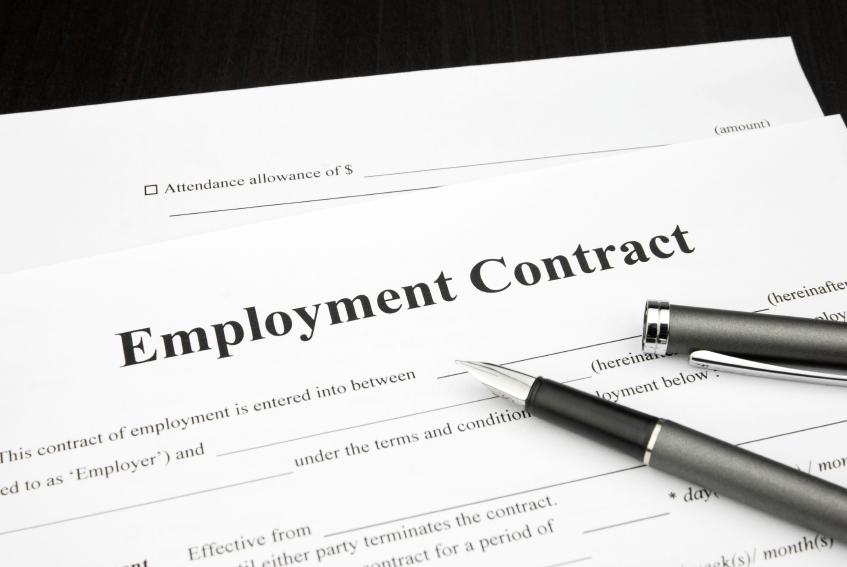
You may be feeling elated because you’re offered your dream job, or it’s your first foray into employment! And it’s pretty natural to feel the rush to sign and send the contract to join the job.
However, the contract is the most important piece of document that will define your employment, as it details everything, from the pay and work hours to the benefits you are entitled to receive. Since signing the contract means that the employee agrees to the t&c, it’s indispensable to ensure that the agreement contains exactly what the HR or manager explained to you.
Did you recently get an employment contract? This article will help you understand the important elements of your contract. We’ve also covered what to do if the contact has something you were unaware of.

Why You Should Go Through Your Employment Contract Before Signing It: The Reasons Explained
The employment contract spells out the terms and conditions of the agreement between you and the employer. It is a legally-binding document that concludes that you agree to the policies of the employer and are willingly joining the job.
Some contracts can even contain clauses that prevent you from suing the employer if they do not provide you with the promised salary or benefits. Thus, reading your employment contract thoroughly becomes even more important before putting a pen on it.
Here are some reasons every employee should go through the contract to ensure that the agreement aligns with their expectations and goals:
It Helps Clarify Any Unclear Provisions
Contracts can sometimes contain unclear language or provisions that may need further explanation. Reading through the contract before signing allows you to identify any areas of confusion and seek clarification from the employer or legal counsel. The unclear provisions include:
-
Ambiguous Language
Sometimes the contract may contain language that is unclear or could be interpreted in different ways, when you read the agreement, you can easily pinpoint such terms and ask your employer for more clarification.
-
Unfamiliar Terms or Concepts
The unfamiliar terms and concepts in your contract might not seem like a big deal, but they can affect the pay and other important benefits you’ll receive. When you read the contract, you can understand the unfamiliar terms to ensure everything in the agreement makes sense.
You Can Identify and Negotiate Unfavorable Terms
The contract is not set in stone and may contain terms that are unfavorable to you. When you read the contract thoroughly, it gives you the opportunity to identify any such terms and negotiate changes before signing it. The unfavorable terms can be:
-
Limitations on Rights
The contract may limit your legal rights in ways that are unacceptable, for example, sometimes employers add clauses that take away the right of the employee to sue them.
When you know about the presence of such terms in your contract, you can negotiate changes to the limitations to ensure your rights are protected.
-
Unfavorable Payment Terms
Sometimes, contracts may specify payment terms that don’t benefit you in any way. Even after negotiating the salary with the HR or hiring manager, some employees get contracts with different salary terms.
No matter what amount was promised by HR, you are legally entitled to receive the salary mentioned in the contract. And when you read the agreement, you can check if the payment terms are exactly what was explained to you.
Minimizes the Risks of Legal Disputes
In a dispute, the contract serves as the legal document governing the relationship between the you and the employer. It is important to fully understand the terms and conditions of the contract before signing it to avoid potential legal disputes in the future.
When you take the time to read and understand the contract, it helps you:
-
Protect Your Rights
By reading the contract before signing, you can ensure that your rights are protected and that you are not giving up any rights that you wish to retain.
-
Reduce the Risks of Legal Troubles
Legal issues can arise when the terms of the contract are not clear or when your employer breaches the contract. When you read the contract beforehand signing it, you can look for clauses and terms that can lead to legal troubles in the future.
Going through the employment contract ensures you know everything about the terms and conditions you and the employer have agreed to. Also, when you know about your contract, you can make sure you are receiving all the benefits your employer promised to provide.
Are you finding it hard to read the contract as it is full of jargon? Professional employment lawyers at Levine and Blit can help you understand the agreement. We make things simple so you know what’s in the contract while telling you about any clauses that can potentially violate your rights.
Call us at 866-351-0116 to schedule your appointment or for more information on how we can help in reviewing your employment agreement.
What Are the Key Points You Should Check in Your Contract?
You should pay attention to numerous things in a contract, but there are some most important elements you cannot ignore at any cost. After receiving an employment agreement from your employer, these are the key points you should carefully look for:
✍️ Note:
We’ve classified the key points into different sections to make it easier for you to understand them. Also, there are multiple examples given under the key points to help you decide if the terms in the contract are relevant according to your job role.
Scope of the Agreement
The scope of the agreement explains the duration of the contract, the job description, and other time-bound obligations both the employer and the employee must fulfill.
Job Description
The employment contract should clearly outline your job responsibilities and duties as an employee. This section should specify your job title, department, reporting structure, and any specific tasks or projects you will be responsible for.
For example, a job description for a software engineer might include duties such as “design, develop, and maintain software applications” and “collaborate with cross-functional teams to resolve technical issues.
Duration of the Employment
The contract should specify the length of employment, such as full-time or part-time, and the start and end dates of the contract. Also, make sure this section explains whether the contract is renewable or subject to termination by you or the employer in any event.
A proper employment contract should state whether the agreement is for a full-time, salaried position and will commence on (start date). The agreement will continue for an initial term of (length of term) years and may be renewed by mutual agreement of both parties.
The Obligation of the Parties (You and the Employer)
When both the employee and the employer enter into a contract, both parties agree to some obligations as specified in the agreement. At the time of looking at your contract, you must go through the obligations you need to fulfill.
Work Hours
The contract should outline the expected work hours, including the schedule, the number of hours per week, and any overtime requirements. In addition, the work hours section might state that you are expected to work a standard schedule of (number of hours) hours per week, from (start time) to (end time), Monday through Friday. Overtime may be required with advance notice.
Performance Standards
Every employee has to meet some performance standards, and your contract should also specify the standards your employer expects you to meet. These can include job duties, quality standards, and attendance requirements.
In this section, the contract should have details about the job responsibilities and duties you must meet according to the job description such as completing tasks to a high standard of quality and maintaining a regular and punctual attendance record.
Employment Benefits
Another section you must pay attention to is the employment benefits, such as leaves and insurance coverage. Make sure the contract specifies the benefits provided to you by the employer, such as health insurance, paid time off, and retirement plans.
This section should detail the particular benefits offered, the eligibility criteria, and any conditions or restrictions that might void these benefits.
Other Important Key Points
Some employment contracts even have multiple clauses that restrict the employee’s actions, such as they can legally bind you from sharing confidential information. When reading your contract, make sure to go through these clauses and try to understand how they can affect your employment:
Grievance Procedures
A grievance procedure is a method for resolving disputes between an employee and an employer. This clause in your contract should explain the procedures for resolving disputes and grievances, such as through mediation or arbitration.
Make sure the contract details the complete process such as the employee first speaking to their supervisor, followed by a meeting with human resources, and then escalating the issue to a higher level of management if necessary.
For example if you fall prey to any type of workplace discrimination, you can file complaints easily while avoiding any legal troubles.
Non-Compete Clause
A non-compete clause is a provision in an employment contract that restricts you from working for a competitor or starting your own business after the termination of your employment. The purpose of this clause is to protect the employer’s confidential information, trade secrets, and business interests.
Non-compete clauses can vary in scope and duration, and they may be subject to specific restrictions and limitations based on local laws. Make sure you properly understand the terms of the non-compete clause before signing the employment contract.
Changes to the Contract
If the employment contract is subject to changes, you’ll find a “changes to the contract” clause in the agreement. This clause should outline the process for amending or modifying the written employment contract.
It should also specify how changes can be made, such as with your and the employer’s agreement or with the approval of a specific individual or department. Lastly, the clause should also specify the notice required for changes and the effective date of the changes.
Termination of employee’s employment
New York is an at-will state, and there are no specific laws that restrict employers from terminating employees. However, when you are in an employment contract, you’ll find the “termination of employment” clause, as employers mention it, to ward off any legal disputes.
Read the clause and go through the conditions and process for termination of employment. It may specify that employment can be terminated by mutual agreement, cause, or by either party.
The clause should also specify the notice required for termination and any severance pay or other benefits that may be provided. Some employers also outline the procedures for ending the employment relationship, such as the return of company property and the protection of confidential information.
What if You Find Something in Your Contract You Don’t Understand?
Employment contracts may contain several elements, and sometimes it becomes difficult to understand the exact context of a term. If you are finding it hard to understand what your contract outlines, you can take the following steps:
Take Your Time
Don’t feel pressured to sign the contract immediately. If you need time to review and understand the terms such as the probationary period, ask for a copy of the contract and take the time you need to make an informed decision.
Ask Questions to the HR
If there is a specific clause or provision that you don’t understand, ask your employer or HR representative to explain it to you. Don’t hesitate to ask questions, and ensure you understand everything mentioned in the contract.
Consider the Bigger Picture
Before making a decision, consider the overall terms of the contract, including compensation, employee benefits, and work hours, to ensure that the contract meets your employment expectations.
Seek Legal Advice
If the issue is complex, you should seek the advice of a legal professional who can help you understand the implications of the clause. Work contract lawyers in New York are well aware of the technicalities of an agreement, and they can help you by reviewing the contract.
An attorney will also tell you about the clauses or terms that may legally bind you after you sign the contract.
Looking for a reputable labor lawyer in New York? Contact Levine & Blit for all types of employment contract-related issues! Our professional attorneys can review the contract to tell you if it aligns with your expectations.
Call us at 866-351-0116 to get your contract reviewed by industry experts.
Benefits of Contacting an Attorney for Getting Your Employment Contract Reviewed
Understanding an employment agreement is no rocket science, and HR is there to assist you with it. But lawyers can make a significant difference, as they review the contract thoroughly to ensure it details everything your employer has promised to you.
Here are more reasons why it’s important to seek legal advice before signing the contract.
Attorneys have Expertise in Contract Law.
Labor lawyers in New York have specialized knowledge and expertise in contract law and can help you understand the legal implications of the terms outlined in such employment contracts. They can identify clauses that may be problematic, such as those that restrict your ability to work for competitors or those that limit your rights to access company information.
They Can Protect Your Rights
An attorney can help ensure that your rights and interests are protected in the contract. For example, they can negotiate changes to terms that may be unfair or unreasonable for you.
It Helps You Avoid Legal Disputes
When you get your contract reviewed by attorneys, you can reduce the chances of potential disputes between you and the employer by ensuring that the contract terms are clear and enforceable. Attorneys can also advise you on your rights and obligations under the contract.
You Can Navigate Complex Legal Issues
An employment contract may contain complex legal issues, such as non-compete clauses, confidentiality agreements, and intellectual property provisions. With the help of a lawyer, you understand these clauses and the implications of signing a contract that contains them.
It Provides Peace of Mind
Knowing that a legal expert has reviewed an employment contract can give you peace of mind and help you make a more informed decision about accepting the job offer. An attorney can provide guidance and support throughout the contract review process, giving you confidence that your rights and interests are protected.
Need Help with Your Employment Contract? Contact Levine & Blit
Signing a contract without going through its terms and conditions is nothing less than inviting legal disputes in the future. Also, it’s important to have the right legal experts who understand all the ins and outs of employment agreements.
At Levine & Blit, we are a trusted labor law firm that can help you by reviewing your employment contract. Our attorneys ensure you understand the terms and conditions of the agreement and are fully aware of your obligations.
If required, we can negotiate with your employer on terms that legally bind you from taking any action.
Speak to our labor law experts at 866-351-0116 and get your new employee contract reviewed today, and for free employment contract consultation.

